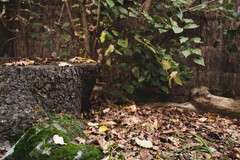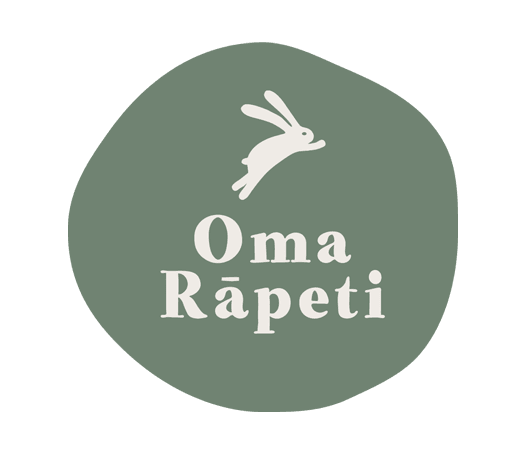Eco-conscious parenting without losing time, or your mind.
At Oma Rāpeti we know how important it is to put the environment front and centre of our practices and teachings. We’re also mothers and parents. Busy ones at that.
As parents, there’s always a tug at our hearts when we go for convenience over sustainability. We’re busy with work, children and life. But what about when everyone is tired, hungry and crying? Do we go for the easiest option possible, like the tempting plastic-wrapped snack? The disposable diaper? To be honest sometimes we do, and that’s okay. For us it’s about always doing better, and learning as we go.
We know how hard it can be to be eco-conscious as a parent while trying to keep our sanity after a busy work day. We also know that we need to make major changes to keep our beautiful earth and Aotearoa around for our tamariki and the next generation.
Tētahi ao, Kotahi waatea
One planet, one chance
Luckily there’s a bunch of eco-friendly solutions (some of which we’ve already tested for you at Oma Rāpeti) that are really easy to implement at home - ones that fit in with busy lives and simply slip into the place of what we’re already doing.
Cloth nappies or compostable disposables
This is one we’ve thought long and hard about at Oma Rapeti. You can read all about our journey from disposables, to cloth, to compostable nappies here.
As an eco-conscious centre, we were delighted to embrace the Little and Brave fully compostable nappy and composting services here in Auckland.
If you’re in Auckland, Whangarei or Tauranga, jump onto the Little and Brave site and grab yourself some wonderful, compostable nappies!
If you’re elsewhere in Aotearoa, we’re sure you’ve heard of cloth nappies. In fact, those of us who were born before the 90s grew up with them covering our bums!
Modern Cloth Nappies (MCNs) are amazing, and a far cry from the terry cloths and safety pins that might spring to mind. There’s a whole range of different types to make it easy for you and your needs as a family, and NONE of them need soaking in a bucket of bleach (you just need to pop the days worth in a quick hot pre-wash, and then do a main hot-wash every 3 days).
MCN’s have features like:
- Waterproof covers
- In-built pockets, some with absorbable inserts already sewn in
- Pockets for extra boosters
- Natural materials like bamboo and hemp
- Not a safety pin in sight! MCN’s use velcro or dome poppers
You can also use a spray bottle of cooled boiled water and some designated fabric wipes in place of wet-wipes (they often do a better job of cleaning up!) and throw them in the wash with the nappies.
The very best thing? Not one single disposable will end up in landfill.
Aprons
What if we told you it was possible to cut down your washing? Say goodbye to Mount Washing and hello to a semi-manageable pile??
We have one word for you: aprons.
That’s right, grab yourself a pinny for your mini and you’ll be amazed at how much time, washing and water you’ll save. Look for washable kid-sized aprons, waterproof is even better, and then let the kids run amuck!
Simply pop an apron on before the morning’s activities (let’s say it’s a messy-play and bubbles kind of morning), hang it up to dry or wipe it down during morning-tea, then chuck it back on for the afternoon art session.
If you do happen to use a waterproof apron it’s possible to keep it on for the entire day, and just wipe it down if things get really grubby. Then when it’s time to pop to the supermarket or the library, just hang it up to dry for a while and marvel at how clean your kiddo looks underneath!
Save the washing pile and cut down on water wastage all at once. It’s a win-win.
Hard Soap and cleaning products
Another simple swap that doesn’t take any time out of your day – eco-friendly cleaning products. It’s an easy transition to get plastic bottles out of your house and you often save money on expensive products as well (bonus).
Consider these swaps:
- Liquid soap for hard soap
- Liquid dish soap for hard dish soap
- Make a batch of all-purpose spray
- Bulk-buy eco-friendly brands
- Refill bottles at bulk-food stores (lots have this option now)
You’ll either be dealing with fully recyclable cardboard packaging, or re-using the bottles that you already have. Once you’ve made the initial swap, you’ll find this habit is an easy one to keep, and you won’t notice any major changes besides less plastic ending up in landfill.
Cotton / bamboo and eco-friendly fabrics
Polyester, nylon and acrylic are all forms of plastic - and all common fabrics used in clothing manufacture. However despite being commonly used, they’re unfortunately not sustainable nor eco-friendly; they use a lot of water and energy to create, have a high carbon footprint and aren’t biodegradable at the end of their life cycle.
When washed, these fabrics also release tiny fibres of plastic, sneaking straight into our beautiful wairua, moana and waterways. These fibres are called microplastics, and they eventually reach the ocean - adding to pollution in the food chain, that’s then ingested by marine wildlife (and even us).
Estimates vary, but it’s possible that a single load of laundry could release hundreds of thousands of fibres from our clothes into the water supply.
Of course we’d rather look for a positive solution and one we’ve found that’s easy to implement is sourcing natural fibres for clothing. Fabrics like organic cotton, bamboo and merino are beautifully soft against baby's skin, sustainable and naturally biodegradable.
There are lots of wonderful brands made right here in New Zealand offering clothing of this nature, with the added bonus that it doesn’t have to travel thousands of miles on an aeroplane to end up in your hands.
And of course, that leads us onto our next idea for you….
Embrace vintage and second hand
Op-shops are a literal treasure trove of hand-knitted goodies, beautiful clothes and any other bits and pieces you fancy. At Oma Rāpeti we love to go op-shopping to find lovely open-ended resources and homely pieces to add to our centre.
By shopping second hand and vintage for clothing you’ll be stopping the cycle of fast fashion, giving clothes a loving second home, and extending the life of good quality clothing. Plus you never know what you’ll find, and you’ll nearly always come away with something beautiful!
Vegetarian and plant-based eating
We are all for vegetarian and plant-based meals – especially when the product has come from our own organic garden here at Oma Rāpeti! The children love to get involved selecting and growing their own plants, and then enjoying them for lunch - yum!
We know that a vegetarian diet can nourish the soul, and the benefits for the environment are a wonderful added bonus. 1/4 of climate changing greenhouse gases come from our food production, and over 1/2 of those come from animal based products. Embracing more plants in our food is one of the greatest acts we can do to fight climate change.
We promise you it’s completely possible for toddlers to enjoy a nutrient rich vegetarian diet, including those “fussy eaters” as well! (Read more about that here!).
Want to give it a go? Try this recipe of Mexican Pinto Beans, served with fresh carrot sticks and cheese. Delicious, healthy and our children love it!
Passing it on
Embrace the teachable moments these ideas give you for your little ones! There’s no better way to look after our precious Aotearoa than to pass on the knowledge and wisdom to our next generation. There are so many moments throughout the day that allow for a wonderful kōrero (chat) about looking after Papatūānuku (Mother Earth).
Making cleaning products:
They can easily help make these, especially if you choose to make these using non-toxic ingredients like vinegar and citrus. Plus, we have it on good authority that toddler’s LOVE spray bottles (get them helping!).
Kai time:
Chat about their vegetables on their plate, pick vegetables from the garden together and cook them together for a delicious, nourishing meal. Talk about where your food comes from and what that means. For example, in the supermarket you may notice oranges from the USA…”wow they must have needed a boat or a plane to get here! But look, here are some apples from the Hawkes Bay, that’s in New Zealand and a lot closer!”
These little conversations all add up and begin to plant the seeds of thought about sustainability and eco-conscious choices.
Water play:
Sometimes during a harsh NZ summer we have water restrictions put in place. This is a great opportunity to speak with tamariki about the precious taonga of water…”sometimes we need to only play in the paddling pool or with the sprinkler for a little while, so that we can save the water for the trees, plants and animals. Perhaps we need to use the water from our paddling pool on the plants afterwards, to make sure they can drink too.”
Again, the little conversations can have the biggest impact, so keep them up!
What do you think? Are these eco-conscious tips something you can see yourself implementing at home? Perhaps you’re already well on the way to your sustainable parenting journey – at Oma Rāpeti we know our journey has only just begun, but it is one we are passionate about and proud of.
Whatungarongaro te tangata toitū te whenua
As man disappears from sight, the land remains


